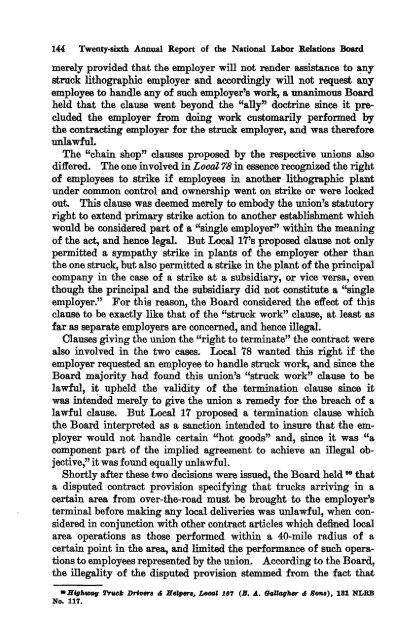TWENTY-SIXTH ANNUAL REPORT - National Labor Relations Board
TWENTY-SIXTH ANNUAL REPORT - National Labor Relations Board
TWENTY-SIXTH ANNUAL REPORT - National Labor Relations Board
You also want an ePaper? Increase the reach of your titles
YUMPU automatically turns print PDFs into web optimized ePapers that Google loves.
144 Twenty-sixth Annual Report of the <strong>National</strong> <strong>Labor</strong> <strong>Relations</strong> <strong>Board</strong><br />
merely provided that the employer will not render assistance to any<br />
struck lithographic employer and accordingly will not request any<br />
employee to handle any of such employer's work, a unanimous <strong>Board</strong><br />
held that the clause went beyond the "ally" doctrine since it precluded<br />
the employer from doing work customarily performed by<br />
the contracting employer for the struck employer, and was therefore<br />
unlawful.<br />
The "chain shop" clauses proposed by the respective unions also<br />
differed. The one involved in Local 78 in essence recognized the right<br />
of employees to strike if employees in another lithographic plant<br />
under common control and ownership went on strike or were locked<br />
out. This clause was deemed merely to embody the union's statutory<br />
right to extend primary strike action to another establishment which<br />
would be considered part of a "single employer" within the meaning<br />
of the act, and hence legal. But Local 17's proposed clause not only<br />
permitted a sympathy strike in plants of the employer other than<br />
the one struck, but also permitted a strike in the plant of the principal<br />
company in the case of a strike at a subsidiary, or vice versa, even<br />
though the principal and the subsidiary did not constitute a "single<br />
employer." For this reason, the <strong>Board</strong> considered the effect of this<br />
clause to be exactly like that of the "struck work" clause, at least as<br />
far as separate employers are concerned, and hence illegal.<br />
Clauses giving the union the "right to terminate" the contract were<br />
also involved in the two cases. Local 78 wanted this right if the<br />
employer requested an employee to handle struck work, and since the<br />
<strong>Board</strong> majority had found this union's "struck work" clause to be<br />
lawful, it upheld the validity of the termination clause since it<br />
was intended merely to give the union a remedy for the breach of a<br />
lawful clause. But Local 17 proposed a termination clause which<br />
the <strong>Board</strong> interpreted as a sanction intended to insure that the employer<br />
would not handle certain "hot goods" and, since it was "a<br />
component part of the implied agreement to achieve an illegal objective,"<br />
it was found equally unlawful.<br />
Shortly after these two decisions were issued, the <strong>Board</strong> held 99 that<br />
a disputed contract provision specifying that trucks arriving in a<br />
certain area from over-the-road must be brought to the employer's<br />
terminal before making any local deliveries was unlawful, when considered<br />
in conjunction with other contract articles which defined local<br />
area operations as those performed within a 40-mile radius of a<br />
certain point in the area, and limited the performance of such operations<br />
to employees represented by the union. According to the <strong>Board</strong>,<br />
the illegality of the disputed provision stemmed from the fact that<br />
el Highway Truck Drivers c6 Helpers, Local .107 (E. A. Gallagher ci Sous), 181 NLRB<br />
No. 117.

















